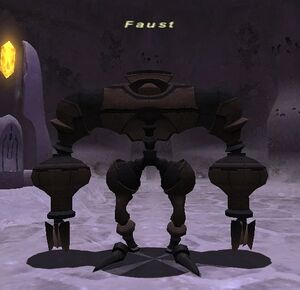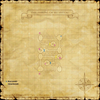Faust
| Zone | Level | Drops | Steal | Spawns | Notes |
|---|---|---|---|---|---|
| Shrine of Ru'Avitau | 83 - 85 | 1 | A, M, S ??? HP ??? MP | ||
|
HP = Detects Low HP; M = Detects Magic; Sc = Follows by Scent; T(S) = True-sight; T(H) = True-hearing JA = Detects job abilities; WS = Detects weaponskills; Z(D) = Asleep in Daytime; Z(N) = Asleep at Nighttime; A(R) = Aggressive to Reive participants | |||||
Horizon Changes 
Notes
- Timed Spawn, appearing 2-3 hours after its previous time of death.

 LSB respawn time is 3-6 hours - need verification if it is still Era+
LSB respawn time is 3-6 hours - need verification if it is still Era+
- Spawn at (F-11) on the fourth map.
- He will just stand in the middle of the room and watch through the two hallways, turning every few seconds. It's possible to stand behind him all the time and use the Monolith-switch behind him, since he only watches into the gangways without moving.
- Killable by: 12 characters level 70+, 5 characters level 75.
- Has increased movement speed when chasing a target.
- Special Attacks: Typhoon (uses this move almost constantly)
- Recommended PLD tank, Typhoon can take multiple shadows every time, thus making it very difficult for a NIN to tank Faust.
- NIN is able to duo this with a RDM just fine but requires skill and a decent -PDT set. Gravity is needed and should be kited with /lockstyle off to avoid being stuck when you nuke or refresh shadows. Anticipate him using Typhoon as soon as he catches you and run to 15y to avoid it and cast nuke before continuing kiting. RDM should keep DoT on at all times.
Historical Background
Faust is a character from Early Modern European literature. Faust has become the archetype for people who make a pact with the Devil to gain something, usually knowledge or power. Faust first appeared in literature in Historia von D. Iohan Fausten by Anonymous (1587), apparently based off of real German alchemist Dr. Johann Georg Faust (c. 1480-1540), a notorious figure (one account tells of him in prison offering to show the chaplain how to remove facial hair without a razor using wine... laced with arsenic which stripped not only the hair, but the skin as well). Contemporaries of Dr. Faust, like Martin Luther, wrote of their belief that he had made a deal with the Devil. This inspired Christopher Marlowe to write The Tragic History of Doctor Faustus (first decade of 1600s). This in turn inspired Faust, Part 1 (1808) by Johann Wolfgang von Goethe. The basic story is: An alchemist named Faust who has no real skills in his profession summons the Devil (in the form of Mephistopheles/Mephisto) and makes a deal with them, where he will serve Faust for a certain period of time, offering him supernatural knowledge and material items, but it will cost Faust his soul. The story symbolizes how pride, vanity, and swindling will invariably doom a person. The adjective faustian has entered the English language as any act involving hubris or arrogance which will doom a person. It should be noted there was a similar tale in Poland, only the figure was named Pan Twardowski.



